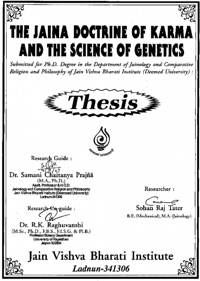This karma decides how long one jīva would live in next life:Āyuṣya karma gene
1.
Narakāyu
decides the span of life in the hell.
2.
Tiryancāyu
decides the span of life in the realm of animals, birds and plants etc. (Tiryanca)
3.
Manuṣyāu
decides the span of life in the human state.
4.
Devāyu
decides the span of life for the heavenly beings.
The jīvas of naraka, devagati and Tīrthankaras etc. live until their span is over and their life is not shortened. While the life span of plants, birds, animals and most human beings may be shorten for some reasons.[50]
The recent discovery of several key genes related to aging suggests that the car analogy is a good one, but not for the obvious reason. The body does not wear out from use as much as it is designed to last only a short time. The reason car companies stay in business is that car needs to be replaced every few years, they are built with planned obsolescence. The human body is built the same way, our parts wear out not simply use but by design. We die from planned obsolescence. Our genetic blue print comes with fine print that reads: warranty valid only for limited time.[51] This is compared with Āuṣya karma.
Mistakes are alterations accumulate in the DNA, especially the mitochondrial DNA, and death follows. The first life extending mutation was found in a gene dubbed "age 1".[52] This is compared with Āyuṣya karma.
Costa, P.T. Jr. and R.R. Mccrae, "Still stable after all these years personality as a key to some issues in adulthood and old age", edited by P.B. Baltes, New York, 1980.
 Prof. Dr. Sohan Raj Tater
Prof. Dr. Sohan Raj Tater
 Doctoral Thesis, JVBU
Doctoral Thesis, JVBU